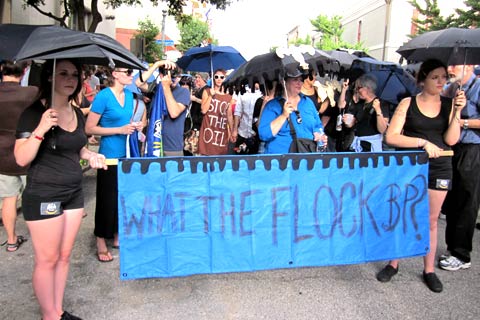Key words :
future energies,
oil spill
,deepwater horizon
,bob dudley
,british petroleum
,tony hayward
Oil spill: BP shrinks by $16 Billion
28 Jul, 2010 12:56 pm
Only time will tell whether BP's accountants have included a sufficient 'haircut' in the second-quarter results to allow the new boss to begin rebuilding the firm's fortunes.
 I've been going though BP's second-quarter earnings press release and results to get a better sense of the impact of the Gulf Coast oil spill on the company's finances.
I've been going though BP's second-quarter earnings press release and results to get a better sense of the impact of the Gulf Coast oil spill on the company's finances. It's a measure of the scale of a 'Supermajor' like BP and the robustness of its underlying cash flows that it could continue to invest more than $6 billion (B) in capital projects and acquisitions in the quarter and even pay down a bit of debt, while recording a charge of $32.2 B against earnings related to the Deepwater Horizon disaster and ensuing oil leak.
To put that figure in perspective, it's more than the market capitalization of Exelon Corporation, the largest owner and operator of nuclear power plants in the US. Yet among all of the remarkable and morbidly-fascinating numbers presented here, the one that stood out for me was the net decrease of shareholder equity by $16 B since the end of 2009. Anyone seeking to explain the decision of BP's board to change CEOs should start there.
The media have tended to focus on the impact on BP's market capitalization, which is a more immediate, though also much more volatile measure of shareholder value. As of today, it's down by about $70 B compared to its pre-disaster level. If it remained there and the market believed that the $32 B that BP has just recognized was likely to be the full extent of the impact on the company, a flurry of takeover bids would follow shortly.
However, when you read BP's description of how they arrived at that amount, it's clear that there's relatively little upside - mainly from its partners in the Macondo field, if they eventually pay the $1.4 B of costs that BP believes they owe - and a great deal of downside. While including the entire $20 B escrow account set up to cover claims, BP has apparently not reserved extra amounts for the outcome of future lawsuits beyond litigation costs, or for the additional fines and penalties that would follow if it were found to have been grossly negligent.
All of these costs must be balanced somehow. BP's other businesses have continued to generate roughly $7 B per quarter, but the key to finding the money to pay all the claims and damages from the Deepwater Horizon disaster rests with the company's decision to sell up to $30 B of assets, with the first $7 B already sold to Apache, and in its coerced but convenient decision to suspend dividend payments for the balance of 2010. The latter was never really necessary to secure the $20 B escrow account, which BP indicates "will be assured by the setting aside of US assets with a value of $20 billion." No matter what, BP will be smaller in the future as a result of this event, but its management has effectively trimmed the shrinkage by investing some of the shareholders' money - their expected dividends - in projects and activities that might otherwise have been curtailed or sold.
Another figure in BP's results that is attracting some attention is the $10 B tax credit it is recording in conjunction with that $32 B charge. It's simple accounting - the spill-related charges are being incurred pre-tax and will reduce the income upon which BP pays taxes - but this may not sit well with Gulf Coast residents and US taxpayers who have been assured by BP that they will be kept whole. This is as meaningful a source of cash as an asset sale, though it could deliver yet another blow to BP's reputation.
Mr. Dudley has assumed the reins of a company that is still undergoing a near-death experience. Time will tell whether BP's accountants have included a sufficient 'haircut' in the second-quarter results to allow him to begin rebuilding the firm's fortunes and restoring the lost shareholder value that was patiently accumulated over many years but destroyed in the course of just a few weeks.
I've already seen a fair amount of speculation concerning whether his Gulf Coast roots and American accent will help mollify angry stakeholders, government officials, and Members of Congress, and it's hard to see how he could fare worse in this regard than his predecessor.
However, it's going to take a lot more than that to enable BP to retain its access to valuable government contracts and exploration leases, including the extremely thorny decision about whether, when and how to bring up the subject of returning to unlucky Macondo to drill some proper wells and produce a field that some experts seem to think could hold up to a billion barrels of oil, less the several million that flowed into the Gulf.
Originally posted on www.energyoutlook.blogspot.com
Key words :
future energies,
oil spill
,deepwater horizon
,bob dudley
,british petroleum
,tony hayward
-
12/12/12
Peak Oil is Nonsense Because Theres Enough Gas to Last 250 Years.
-
05/09/12
Threat of Population Surge to "10 Billion" Espoused in London Theatre.
-
05/09/12
Current Commentary: Energy from Nuclear Fusion Realities, Prospects and Fantasies?
-
04/05/12
The Oil Industry's Deceitful Promise of American Energy Independence
-
14/02/12
Shaky Foundations for Offshore Wind Farms







 Read more
Read more